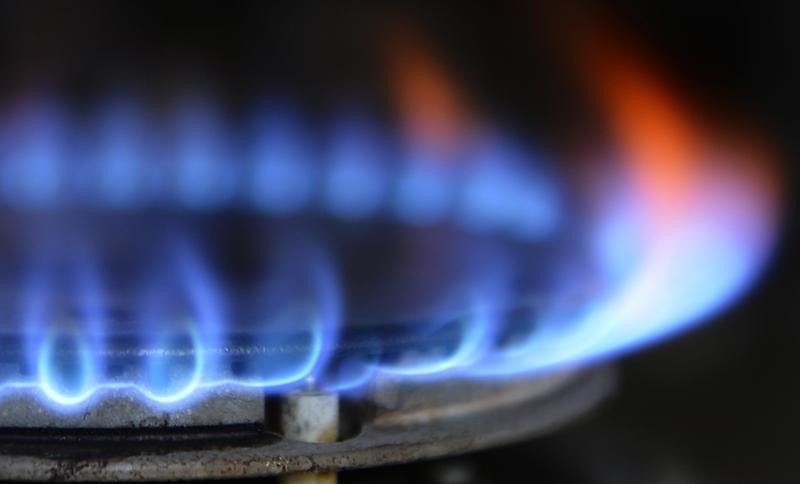How are energy investors positioned?
(Bloomberg) -- Russia plans to curb natural gas flows on the Nord Stream pipeline -- less than a week after bringing the link back from maintenance -- jolting European energy markets and escalating concerns over a supply crunch on the continent this winter.
Gazprom PJSC (OTC:OGZPY) will cut shipments via the link to Germany to about 20% of its capacity from 7 a.m. Moscow time on Wednesday, the Russian gas giant said in a statement. One more gas turbine, crucial for the supply, is due for maintenance and will be taken out of service then, according to the company.
Gas had been flowing through the pipeline -- the main gas conduit from Russia to the European Union -- at about 40% of capacity since it returned from 10 days of maintenance on July 21. That’s about the same level as before the works.
Benchmark European gas prices soared as much as 12% on the news and French year-ahead power jumped to a record. Europe is in the grips of its worst energy crisis in decades, and governments have been racing to fill gas storage sites ahead of winter. The supply crunch has seeped into the broader economy, contributing to concerns about a possible recession and raising the risk of gas rationing during the colder months.
“It puts stress on Europe for gas curtailments,” said Mauro Chavez Rodriguez, research director for European gas & LNG at Wood Mackenzie Ltd. “If there are no effective gas and electricity demand savings implemented now there will be inevitable curtailments for industries in the case of cold winter.”
A spokeswoman for Germany’s economy ministry said the government is “monitoring the situation very closely” together with the Federal Network Agency. “According to our information, there is no technical reason for a reduction in deliveries” of gas, the spokeswoman said by email.
Approval requirements for the delivery of the turbine in question had been met, she said, adding that Canada had granted the exemption needed under Canadian law and no exemption was required according to EU sanctions regulations.
Putin’s Warning
President Vladimir Putin last week warned that Nord Stream flows could fall further if a spat over its turbines, which help pump gas through the network, isn’t resolved. The units, manufactured by Siemens Energy AG, need to go to Canada for maintenance, and sanctions-related delays threaten their timely return.
One turbine that was recently serviced is now stuck en route to Russia from Germany amid delays related to paperwork. The arrival of that component would allow flows at 40%, Putin has said. Since only one turbine is now left in working condition in Russia, based on Gazprom’s statements, the part from Canada will be the second one. Normally, the station needs six major turbines.
Earlier Monday, Gazprom (MCX:GAZP) said there were still sanctions-related issues around the turbine now on its way back to Russia, even though Siemens had provided the company with some paperwork, as well as around the other units that need to be repaired. Siemens declined to comment.
A reduction in Nord Stream flows “was unfortunately expected” given the recent comments from Russia, said Tom Marzec-Manser, head of gas analytics at ICIS. “The key question now is how long will this reduction to just 20% of the pipe’s capacity actually last.”
Moscow has been curbing gas shipments to the European Union for months, opening itself up to accusations that it’s using energy as a weapon, with regional tensions high following Russia’s invasion of Ukraine. The Kremlin has staunchly rejected the allegation.
EU Concerns
The EU still relies on the little gas its getting from Russia to fill its winter stockpiles. Concerns about gas shortages have already spread to every market, with the European Commission calling on all member states to participate in the effort to save gas, regardless of how dependent they are on Russia for the fuel.
Gazprom cut Nord Stream supplies in two steps last month, citing issues with turbines at the Portovaya compressor station. The company has said that those issues were caused by delays in repairs by Siemens amid international sanctions, and the shutdown of some equipment following orders from Russia’s safety regulators.
The turbine from Canada is still in Germany amid paperwork delays, Russian newspaper Kommersant reported on Sunday. If Gazprom provides the required documents to Siemens, the turbine shipment may happen in the next few days, it said.
Despite the turbine spat, Russia is “not interested” in a complete cutoff of its gas deliveries to Europe, Kremlin spokesman Dmitry Peskov said earlier on Monday. However, “if Europe continues its course of absolutely recklessly imposing sanctions and restrictions that are hitting it, the situation may change,” he said.
Read also: How Nord Stream Became So Important in Europe’s Gas War
©2022 Bloomberg L.P.
